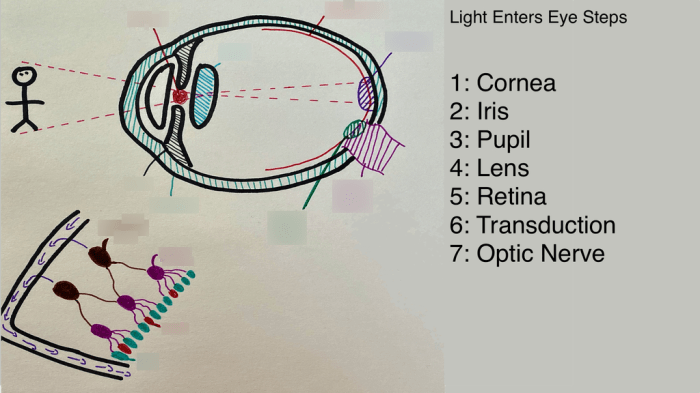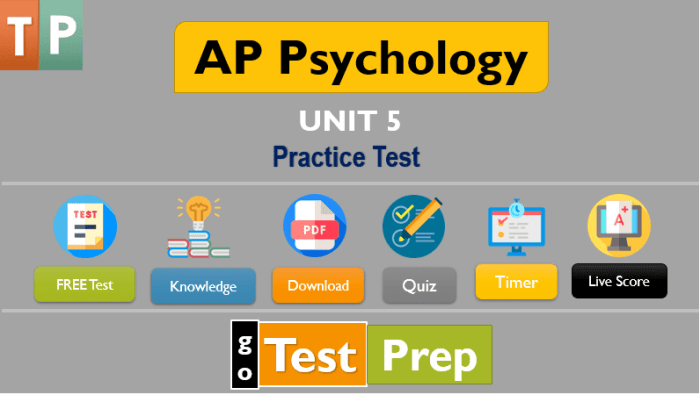Embark on a comprehensive exploration of the AP Psychology Unit 4 Test Multiple Choice, a crucial component of the Advanced Placement Psychology exam. This guide delves into the intricacies of the test, providing insights into its structure, content distribution, and effective test-taking strategies.
As you navigate the complexities of Unit 4, you will encounter key psychological theories, concepts, and research methodologies. Our in-depth analysis unravels the strengths and weaknesses of these theories, equipping you with a nuanced understanding of their applications in real-world scenarios.
Overview of AP Psychology Unit 4 Test Multiple Choice

The AP Psychology Unit 4 Test is a multiple-choice exam that covers the following content areas:
- Key Concepts and Theories
- Research Methods and Statistics
- Social Psychology
- Developmental Psychology
The test consists of 100 questions, each worth one point. The questions are divided into three sections:
- Section 1: Multiple Choice (50 questions)
- Section 2: Free Response (2 essays)
- Section 3: Long Free Response (1 essay)
The multiple-choice section is designed to assess your understanding of the key concepts and theories covered in Unit 4. The questions are typically straightforward and can be answered by applying the concepts you have learned to new situations.
Here are some tips for approaching the multiple-choice section of the AP Psychology Unit 4 Test:
- Read the question carefully and make sure you understand what it is asking.
- Eliminate any answer choices that you know are incorrect.
- Guess if you have to, but only if you have eliminated at least two answer choices.
- Don’t spend too much time on any one question. If you can’t answer it quickly, move on and come back to it later.
- Use the process of elimination to narrow down your choices.
- Behaviorism
- Cognitivism
- Humanism
- Psychodynamic theory
- Social cognitive theory
- Behaviorism is used to explain how children learn to behave in certain ways.
- Cognitivism is used to explain how people think and solve problems.
- Humanism is used to explain how people develop their sense of self.
- Psychodynamic theory is used to explain how unconscious conflicts can affect behavior.
- Social cognitive theory is used to explain how people learn from others.
- Surveys
- Experiments
- Observational studies
- t-tests
- ANOVA
- Chi-square tests
- Social influence
- Conformity
- Obedience
- Social groups
- Social influence is used to explain why people buy certain products.
- Conformity is used to explain why people follow the crowd.
- Obedience is used to explain why people follow orders from authority figures.
- Social groups are used to explain why people feel a sense of belonging.
- Physical development
- Cognitive development
- Social development
- Physical development is used to explain why children need to eat a healthy diet and get regular exercise.
- Cognitive development is used to explain why children learn at different rates.
- Social development is used to explain why children need to interact with other children.
- Which of the following is a key concept in behaviorism?
- What is the difference between a survey and an experiment?
- What is the role of social influence in human behavior?
- What are the major stages of human development?
- Read the question carefully and make sure you understand what it is asking.
- Eliminate any answer choices that you know are incorrect.
- Guess if you have to, but only if you have eliminated at least two answer choices.
- Don’t spend too much time on any one question. If you can’t answer it quickly, move on and come back to it later.
- Use the process of elimination to narrow down your choices.
- Read the directions carefully and make sure you understand how much time you have for each section.
- Pace yourself so that you have enough time to answer all of the questions.
- Don’t spend too much time on any one question. If you can’t answer it quickly, move on and come back to it later.
Key Concepts and Theories
The following are the major psychological theories and concepts covered in Unit 4:
These theories are used to explain a wide range of psychological phenomena, from learning and memory to motivation and personality.
Here are some examples of how these theories are applied to real-world scenarios:
Each of these theories has its own strengths and weaknesses. It is important to understand the different theories and how they can be used to explain psychological phenomena.
Research Methods and Statistics
Research methods are the tools that psychologists use to collect data. The most common research methods are:
Each research method has its own strengths and weaknesses. It is important to choose the right research method for the question you are trying to answer.
Statistics are used to analyze data and draw conclusions from research studies. The most common statistical tests are:
Statistics can be used to test hypotheses and make predictions. It is important to understand the basics of statistics in order to be able to interpret research findings.
Ethical considerations are important in psychological research. Psychologists must protect the rights of their participants and ensure that their research is conducted in a responsible manner.
Social Psychology
Social psychology is the study of how people think, feel, and behave in social situations.
The following are some of the key concepts in social psychology:
Social psychology can be used to explain a wide range of social phenomena, from why people conform to why people obey authority figures.
Here are some examples of how social psychology is applied to real-world scenarios:
Social psychology is a complex and fascinating field of study. It can help us to understand ourselves and others better.
Developmental Psychology
Developmental psychology is the study of human development from infancy to adolescence.
The following are some of the key concepts in developmental psychology:
Developmental psychology can be used to explain a wide range of developmental phenomena, from why babies learn to walk to why teenagers develop a sense of identity.
Here are some examples of how developmental psychology is applied to real-world scenarios:
Developmental psychology is a complex and fascinating field of study. It can help us to understand ourselves and others better.
Practice Questions and Strategies

Here are some practice questions that cover the different content areas of Unit 4:
Here are some strategies for answering multiple-choice questions effectively:
Time management is also important on the AP Psychology Unit 4 Test. Here are some tips for managing your time effectively:
FAQ Summary: Ap Psychology Unit 4 Test Multiple Choice
What is the format of the AP Psychology Unit 4 Test Multiple Choice?
The test consists of 50 multiple-choice questions, each with four answer options.
What content areas are covered on the test?
The test covers a range of content areas, including key psychological theories, research methods, social psychology, and developmental psychology.
What are some effective test-taking strategies?
Effective strategies include reading the questions carefully, eliminating incorrect answer choices, and managing your time wisely.